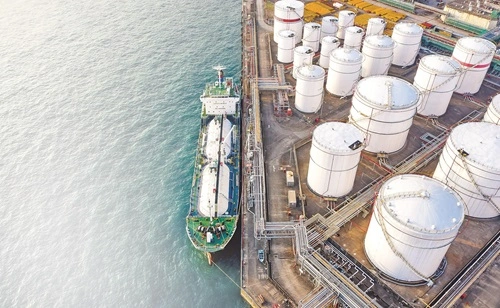India, one of the largest importers of crude oil globally, may face significant disruptions to its energy supply chain as a result of new sanctions imposed by the United States on Russian tankers. The sanctions, aimed at further restricting Russia’s oil exports amid the ongoing geopolitical tensions following the Ukraine conflict, have far-reaching implications for India’s energy security and its broader economic landscape.
The Sanctions and Their Scope

The latest U.S. sanctions target a range of Russian oil tankers and shipping entities, aiming to curb Moscow’s ability to finance its military activities. These sanctions build upon earlier measures that imposed price caps on Russian crude oil and restricted access to Western insurance and financial services for entities involved in transporting Russian oil above the capped prices.
By blacklisting tankers and tightening regulations, the new sanctions aim to create bottlenecks in the transportation of Russian oil to global markets. The measures are expected to severely impact countries like India and China, which have increased their imports of discounted Russian crude in recent months.
Impact on India’s Oil Supplies
India has become a major consumer of Russian crude oil, benefiting from discounted prices that have helped the country manage its energy costs amid global inflationary pressures. Russian oil accounts for a substantial portion of India’s overall crude imports, with refineries optimizing their operations to process this specific grade of crude.
The new U.S. sanctions threaten to disrupt this arrangement by limiting the availability of tankers willing to transport Russian oil to India. The sanctions also complicate the payment mechanisms, insurance coverage, and logistical arrangements that underpin these transactions. As a result, Indian refiners may face delays, higher shipping costs, and difficulties in sourcing alternative supplies.
Economic Ramifications for India
The potential disruption in oil supplies comes at a critical time for India, as it strives to sustain its economic recovery and manage inflation. Energy prices play a central role in determining the country’s inflation trajectory, with any significant increase in crude oil costs likely to affect transportation, manufacturing, and overall consumer prices.
Moreover, India’s dependence on imported crude oil—over 85% of its total consumption—is a key vulnerability in its energy policy. A disruption in Russian oil supplies could force India to diversify its sourcing, potentially at higher costs, which may strain its fiscal balance.
Navigating Geopolitical Challenges
India has maintained a delicate balancing act in its diplomatic relations with both the U.S. and Russia. While the U.S. is a key strategic partner for India in areas like defense, technology, and trade, Russia remains a crucial supplier of energy and defense equipment.
New sanctions add complexity to this balancing act. India has consistently emphasized its energy security needs, advocating for an independent approach to sourcing oil based on its national interests. However, the increasing scope of U.S. sanctions could pressure India to recalibrate its strategies.
Alternative Strategies and Opportunities
To mitigate the impact of the sanctions, India may explore several options:
- Diversifying Oil Sources: India could seek to increase imports from countries in the Middle East, Africa, and the Americas. However, this may involve higher costs and logistical adjustments.
- Strengthening Domestic Reserves: Expanding strategic petroleum reserves could help India manage short-term supply shocks and price volatility.
- Enhancing Energy Independence: Accelerating investments in renewable energy, biofuels, and domestic oil exploration could reduce reliance on imported crude in the long run.
- Diplomatic Engagement: India could engage with the U.S. to seek exemptions or carve-outs, emphasizing the importance of stable energy supplies for its economic stability.
A Test of Resilience
The new sanctions are a stark reminder of the interconnected nature of global geopolitics and energy markets. For India, the challenge lies in safeguarding its energy security while navigating a rapidly evolving geopolitical landscape. As the world’s third-largest oil importer, India’s response to this situation will have significant implications for its economic trajectory and its standing as a major player in global affairs.
In the coming months, policymakers will need to carefully weigh options, balancing short-term needs with long-term goals. The outcome of these efforts will determine not only how India manages its energy crisis but also its ability to assert its strategic autonomy on the global stage.